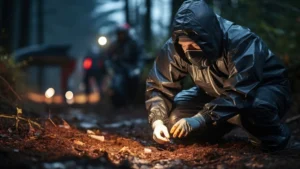The Importance of Mental Health for Police Officers.
The Reality of Police Work
As you know, police work is a demanding and often dangerous profession. We are exposed to traumatic events on a regular basis, which can take a toll on their mental health. In addition, police work is often stressful and demanding, with long hours and shift work. These stressors also contribute to mental health problems.
It’s important to remember you are not alone. Talk to a friend, a supervisor, loved one, professional or me.
The Unique Stressors of Police Work
There are some unique stressors that come along with our line of work. For example, we have a recurring front row seat to traumatic events that others don’t such as regular violence or death. We are exposed to graphic images or information about these events or depraved incidents of innocents no person should have to see. We deal with the stress of being in potentially dangerous situations and having to make split-second decisions that could have life-or-death, criminal, civil, moral or civic consequences. It’s a lot. These factors can contribute to mental health problems such as anxiety, depression, and post-traumatic stress disorder (PTSD).
The Impact of Police Work on Mental Health
Studies have shown that we as police officers are at increased risk for developing PTSD, anxiety, and depression. Furthermore, the rates of suicide among police officers are higher than the general population and sadly, you may know someone who completed suicide. These mental health problems can impact an officer’s job performance, personal relationships, and physical health.
The Consequences of Poor Mental Health for Police Officers.
The Impact of Poor Mental Health on Job Performance
Poor mental health can have a significant impact on job performance. Symptoms of poor mental health can include fatigue, irritability, difficulty concentrating, and memory problems – all of which can make it difficult to perform the duties the public expects us to do effectively. In addition, officers who are struggling with mental health issues may be more likely to make errors in judgment, use excessive force or gloss over an investigation that demanded attention.
The Impact of Poor Mental Health on Personal Relationships
The personal relationships of officers can also be negatively affected by poor mental health. The stress of the job can make it difficult to maintain healthy relationships with spouses, children, and other loved ones – you’ve seen it in co-workers and yourself. We who are struggling with mental health issues may be more likely to experience conflict in their personal relationships. Get help if you need it.
The Impact of Poor Mental Health on Physical Health
Poor mental health can also take a toll on physical health. Symptoms of poor mental health can lead to increased levels of stress, which can in turn lead to physical problems such as headaches, stomachaches, and insomnia. In addition, officers who are struggling with mental health issues may be more likely to engage in unhealthy behaviors such as smoking, excessive drinking, risky off-duty behaviors or get hooked on energy drinks to survive.
Steps That Can Be Taken to Improve Mental Health for Police Officers.
Improving Work-Life Balance
Police officers often have difficulty maintaining a healthy work-life balance. The demands of the job can make it difficult to find time for family, friends, and hobbies. This can lead to feelings of isolation and loneliness, which can exacerbate mental health problems. There are a few things that can be done to improve work-life balance for police officers:
- Encourage officers to take advantage of their vacation time. It is important for them to unplug from work and recharge!
- Schedule regular check-ins with supervisors or co-workers. This gives officers an opportunity to voice any concerns they may have about their workload or stress levels. This can be formal or informal but should be done holistically.
- Create opportunities for social bonding among officers. This could include organizing off-duty activities or hosting events at the station. Maybe a bacchii-ball tournament or meme war?
Accessing Mental Health Resources
One of the most important things that can be done to improve mental health for us is to provide access to mental health resources. This could include:
- Establishing an employee assistance program (EAP). This would provide confidential counseling services for officers dealing with personal or work-related issues.
- Making sure there is adequate coverage for mental health professionals on staff at the department. This would ensure that officers have someone to talk to when they are experiencing mental health problems.
- Providing training on how to identify and respond to signs of mental illness in others. This would help officers feel more prepared and confident in their ability to deal with mentally ill suspects or victims during calls for service.
Conclusion
The Importance of Mental Health for Police Officers cannot be understated. Police work is a demanding and often dangerous profession that can take a toll on one’s mental health. Poor mental health can lead to job performance problems, relationship difficulties, and physical health issues. There are steps that can be taken to improve mental health for police officers, including improving work-life balance, accessing mental health resources, and promoting a culture of mental health awareness and support. It is important for police departments to prioritize the mental health of their officers in order to ensure that they are able to effectively carry out their duties.





